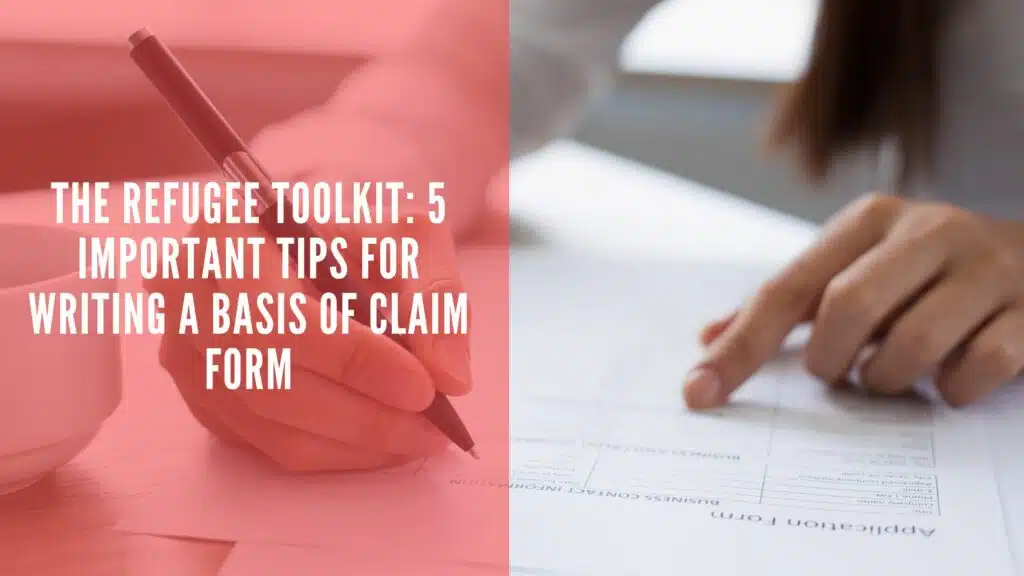Whether you are claiming refugee protection at a port of entry following your eligibility interview with the Canada Border Services agency (CBSA) or claiming refugee protection inside of Canada with Immigration, Refugees and Citizenship Canada (IRCC), you will need to complete and submit a basis of claim at some point in your refugee proceeding.
When writing a Basis of Claim form (BOC) for a refugee claim in Canada, it’s essential to present a clear, concise, and truthful account of your situation.
The Basis of Claim form also known as BOC is used to explain who you are, why you are seeking protection in Canada, and the details about your claim.
It will be the document under which you will be seeking refugee protection in Canada. It is an essential and important document in your refugee proceeding. It will be an important document considered by the Refugee Protection Division in deciding the case and you could be questioned about it at your refugee hearing if your case isn’t decided on paper.
When completing your basis of claim, remember these five important factors:
1. Provide Detailed and Specific Information in your Basis of Claim form
Your BOC form should include detailed information about who you are, why you are seeking refugee protection, and the specific incidents that led you to flee your home country. Be as specific as possible about dates, places, and people involved. General or vague statements can weaken your claim.
Ensure to describe how and when you arrived in Canada. Include details about the route you took, how you traveled, and why you chose to come to Canada. If you traveled through or lived in other countries before arriving in Canada, explain why you did not or could not seek protection in those countries
Disclose if you have made a refugee claim or immigration application in Canada or any other country. Provide details about the outcome of those applications.
Describe any particular incidents that have led you to seek asylum, including dates and locations. If you have faced threats, harassment, violence, or other forms of persecution, provide detailed descriptions of these events.
2. Be Consistent in your Basis of Claim form
Ensure that the information in your BOC form is consistent with any other information you have provided to the Canadian authorities or will provide to the Canadian authorities, such as in your interviews or in other documents. Inconsistencies, even if unintentional, can cast doubt on the credibility of your claim.
3. Explain why you fear persecution or harm in your Basis of Claim form
Once you have read the definition of what a person in need of protection and a Convention Refugee is determine which situation(s) apply to you.
Once you have determined which situation applies to you, clearly articulate why you fear persecution or harm in your home country in your Basis of claim form.
This should include the reasons for seeking protection in Canada.
4. Address Any Issues in Your Claim and be transparent in your Basis of Claim form
If there are any apparent weaknesses or issues in your claim (such as delays in leaving your country or travel to other countries where you might have sought protection), address these proactively in your BOC form. Be transparent about any potential issues in your claim.
Providing a reasonable explanation for these issues can help strengthen your claim and address concerns that might arise subsequently.
5. Start determining what documents can help support your claim as soon as possible in your Basis of Claim form
Once you are done with the Basis of claim, determine what documents can support your claim. This can include identity documents, police reports, medical records, letters, or other evidence that corroborates your story. If certain documents are not available, prepare your explanation.
Remember, the BOC form is a crucial document in your refugee claim process.
It’s advisable to seek assistance from a lawyer to ensure that your form is completed accurately and effectively. We can provide valuable guidance tailored to your specific situation and help you navigate the complex refugee claim process in Canada.
For more information you may want to speak to our immigration lawyer.
Please note that this should not be construed as Legal Advice. This is General Information and should not be acted on.

